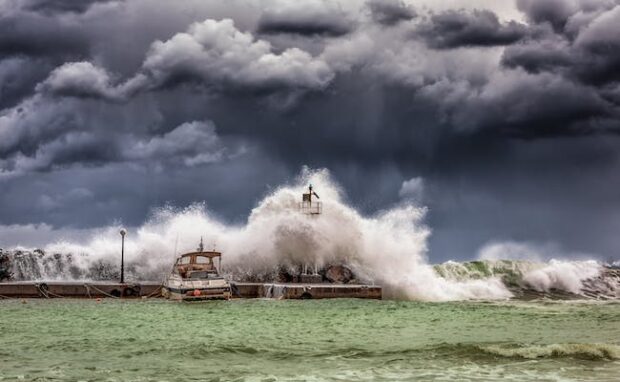Waves grow more intense due to climate change
A Colorado State University researcher warned that we are having larger waves and stronger storms due to climate change. Professor of Geophysics and Department Head Richard Aster wrote on ScienceAlert that global warming is intensifying seasonal storms and heating our oceans excessively.
The scientist warns these trends could endanger coastal communities. Moreover, raging, towering waves could thrash coastlines, damaging infrastructure and eroding the land. Worse, they could ruin marine ecosystems and resources, leading to other societal problems. Understanding these trends could help us prepare for these scenarios.
This article will discuss the recent climate change findings regarding ocean waves. Later, I will share some of global warming’s latest impacts.
How does climate change affect waves?

Richard Aster and his colleagues studied seismic activity to understand why waves have been intensifying in recent decades. Eventually, they discovered climate change is its root cause.
Aster initially explained the connection between seismic waves and ocean waves. Most know that earthquakes may shake our seas to create tsunamis, but did you know the ocean can also impact seismic activity?
He calls the most energetic method secondary microseism, which occurs when ocean waves interfere with one another. As a result, they create pressure variations on the sea floor and produce seismic waves.
However, climate change likely impacts the second type, called the primary microseism process. Ocean waves produce these signals as they push and pull on the seafloor.
Aster’s study suggests that 41 of the 42 seismograph sites worldwide showed highly significant and progressive increases in energy over the decades. That means annual ocean wave energy increased from 0.27% to 0.35% since the late 20th century.
The increasing storm intensity and coastal hazards coincide with other climate change impacts. These include the wave-dampening effects of growing and shrinking Antarctic sea ice and the fluctuating effects of El Niño and La Niña.
You may also like: Groundbreaking AI predicts 70% of earthquakes
As a result, Aster and his colleagues concluded that climate change is strengthening storms and waves. Also, oceans have absorbed roughly 90% of excess heat connected to rising greenhouse gases.
That surplus energy can lead to more devastating waves and more raging storms. Aster and his team also warned coastal communities are at risk.
The ongoing sea level rise further exacerbates the effects of increasing wave energy. Thus, they emphasized the importance of managing climate change, bolstering coastal infrastructure, and enhancing environmental protection strategies.
What are the other climate change impacts?

Another alarming climate change trend is our record-breaking global temperatures. The European Union’s Climate Change Service (C3S) indicated an uptick of 2.07°C above the pre-industrial average.
Samantha Burgess, C3S Deputy Head on the X social media platform, said, “This was the first day when global temperature was more than 2°C above 1850 to 1900 levels.” ScienceAlert says the record started on November 17, 2023, Friday and continued to November 18, 2023, Saturday.
As a result, climate experts urged the world to strive harder for the lower limit to avoid more serious climate impacts. Also, Penn State researchers said raising global heat by 2°C above preindustrial levels would expose the following populations to unbearable temperatures:
- 800 million people in sub-Saharan Africa
- 2.2 billion Pakistanis and Indians in the Indus River Valley
- A billion people in eastern China
Most lower-to-middle-income areas may lack access to air conditioning and similar systems. As a result, they are unlikely to manage the extreme heat.
W. Larry Kenney and his colleagues conducted 462 separate experiments to document the combined heat, humidity, and physical exertion levels humans can tolerate before they cannot maintain a stable core temperature. Eurekalert said these limits are lower than previously theorized.
You may also like: Coral reef restoration to reverse climate change damage
“As people get warmer, they sweat, and more blood is pumped to their skin so that they can maintain their core temperatures by losing heat to the environment,” Kenney said.
“At certain levels of heat and humidity, these adjustments are no longer sufficient, and body core temperature begins to rise. This is not an immediate threat, but it does require some form of relief.”
“If people do not find a way to cool down within hours, it can lead to heat exhaustion, heat stroke, and strain on the cardiovascular system that can lead to heart attacks in vulnerable people.”
Conclusion
Ocean waves intensify as climate change continues to worsen. As a result, higher waves and stronger storms could batter coastal communities.
These worsening conditions could make sea traversal difficult, hampering travel, trade, and fishing. Soon, these weather conditions could have social and economic consequences.
Learn more about this ocean wave energy study on its Nature Communications webpage. Check out more digital tips and trends at Inquirer Tech.